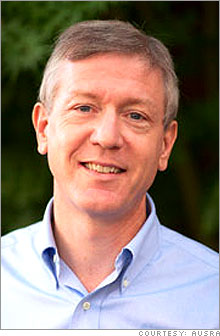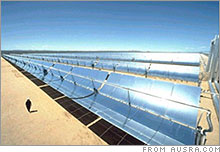Investors bask in solar power's sunSilicon Valley startup Ausra says it can generate cheap, reliable electricity from the sun. Fortune's Marc Gunther looks at whether solar power's day has finally come.(Fortune Magazine) -- By now, you've probably heard that the solar energy business is booming. Wal-Mart (Charts, Fortune 500) and Tiffany's, Microsoft (Charts, Fortune 500) and Google, Estee Lauder and Target (Charts, Fortune 500), Kohl's and Staples - all use or have announced plans to use solar photovoltaic panels on their rooftops to power their businesses. But you may not have noticed the arrival - actually, the revival - of another solar technology, called solar thermal. Whereas solar photovoltaic panels are installed directly on buildings and convert sunlight into electricity, solar thermal power is more complicated: it uses mirrors to concentrate sunlight and heat liquids, which are then used to drive turbines to make electricity.
Solar thermal has as much potential as solar photovoltaics and maybe more because it can be deployed on a large scale - big enough to light up shopping malls or towns, not just a home or a building. Like solar photovoltaics, solar thermal has been around for a long time. The problem is, until now, it's been too expensive and the electricity generation too intermittent (think lack of sunlight) to compete with coal or nuclear power plants. Solar thermal's day, however, may finally have arrived, thanks to improved technology, federal tax credits and state requirements that utilities buy power from renewable sources. Federal climate change legislation - which, if enacted, would drive up the cost of electricity from fossil fuels - has also tilted the playing field in favor of low-carbon power sources like solar thermal and wind power. Today entrepreneurs are racing to cash in. Three large-scale solar thermal plants have been announced in recent months in California, the latest coming from a Silicon Valley startup called Ausra. Ausra announced this week that it has raised more than $40 million from venture capital firms Khosla Ventures and Kleiner, Perkins, Caulfield and Byers, and said it plans to build a 175-megawatt solar thermal power plant at an undisclosed location in central California. Begun five years ago as an Australian company called Solar Heat and Power, Ausra relocated to Palo Alto last year with the backing of well-respected technology investors Khosla (a co-founder of Sun Microsystems (Charts, Fortune 500)) and Ray Lane (the former president of Oracle (Charts, Fortune 500)), both of whom sit on the company's board. "We are disruptively lower cost than existing solar technologies," says John O'Donnell, Ausra's executive vice president, and a longtime technology industry executive. Ausra isn't the only company that's betting big on solar thermal. A Spanish firm called Acciona Solar Power began operating a 64-megawatt solar thermal plant in the desert south of Las Vegas in June. Pacific Gas & Electric (Charts, Fortune 500) said in July that it will contract to buy 550 megawatts of solar thermal power to be produced in the Mojave Desert by an Israeli company called Solel Solar Systems. And BrightSource Energy, a Oakland, Calif.-based privately held company, said last week that it plans to build a 400-megawatt solar thermal plant, also in the Mojave. Earlier, Stirling Energy Systems of Phoenix, Arizona, announced plans for two solar thermal plants in partnership with utilities in southern California. Vinod Khosla, one of Silicon Valley's most powerful venture capitalists and an Ausra investor (see "24 top innovators" ), boasted recently that the company's first solar thermal plant would be cheaper than any of the "clean coal" plants on the drawing board. "I'll beat them any day of the week on price, and I'll build them more quickly. I'll challenge anybody with this," Khosla told the Toronto Sun. Such braggadocio is often heard these days in Silicon Valley, where clean energy startups are as ubiquitous as dot-coms were in the late 1990s. But Ausra is a worth a look for a couple of reasons - the pedigree of its backers and the fact that it is part of a boomlet in the solar thermal business. Ausra executives say the company's technology and manufacturing plans will reduce the capital costs of building solar thermal plans. Once its plants are running, and its borrowing costs come down, the company says it will sell electricity for much less than existing solar or wind installations. "As soon as we can build solar power projects with the same cost of capital as building conventional coal or natural gas plants," O'Donnell says, "we'll deliver electricity at the same cost as coal." If so, that by itself would be a significant breakthrough. A second claim being made by Ausra is equally bold. The company says, rain or shine, its plants will be able to store heat for up to 20 hours, allowing it to sell electricity to the grid whenever demand is greatest. These claims need to be regarded skeptically. But the fact that venture capitalists, utilities and startups are pouring significant money into solar thermal suggests that this technology isn't smoke and mirrors - to the contrary, it may be an opportunity to replace smoke with mirrors. |
| |||||||||


